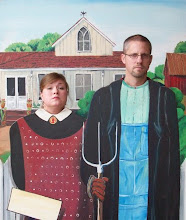Today, we begin the book of Mark. This is one of the synoptic Gospels, meaning that it tells the story of Jesus from basically the same standpoint as Matthew and Luke. Therefore, we will be reading a lot of the same types of things in this book as we did in Matthew. Bearing that in mind, I'll try to limit my comments to things that I didn't point out as we went through Matthew so as to avoid redundancy. Mark is certainly a distinct book. Its character is much different that Matthew. He is much more succinct. Also, he moves from one vignette to another quite rapidly. This is pronounced by the repetition of the word "immediately." Now, let's dive in!
There is no genealogy recorded in Mark. Many commentators feel that the reason behind this is that the purpose of Mark was to present Jesus as a servant, and no one really cares about the family line of a servant. You can weigh in with your own thoughts on that one.
John the Baptist was the one to prepare the way for the Messiah. To do that, he preached a message of repentance. Certainly, it is a humble and contrite heart that is best suited to receive the Savior! And humility is just what John demonstrated. He noted that he was not worthy even to loosen the strap of Jesus' sandal (this was the job of a household servant - to remove the sandals in order to wash the feet of the master of the house).
Jesus' authority is again pointed out with regularity. His authority over demons amazes the people. What amazes, and also comforts, me is that the demons couldn't even speak without permission from Jesus (1:34)! What have I to fear?!
When the men brought the paralyzed man to Jesus in chapter 2, it says that Jesus "saw" their faith. I thought faith was something inward, invisible! This is a clue to the nature of true faith. While it is something that is within a person, it always has external results. This is why James says that he will show you his faith by his works.
Jesus' statement "Those who are well have no need of a physician, but those who are sick. I came not to call the righteous, but sinners” should not be understood as a vindication of the self-righteous Pharisees. Quite the opposite! What Jesus is really saying here is that those who "think" that they are well will never go seek out help from a physician. It is only those who "know" they are sick that end up going to the doctor. The point is this - you must come to grips with the fact that you are a sick sinner in order to come in humble repentance to the only One who can heal your soul.
In chapter three, you really get the impression that the Pharisees feel threatened by Jesus. Why else would they plot to destroy someone who is doing so much good?! At the end, there are words of comfort for us. When we do the will of God, we prove to be the brothers of Jesus. We bear the family resemblance, and we will be partakers of the inheritance! Praise to God our Father!
Saturday, September 19, 2009
Subscribe to:
Post Comments (Atom)

No comments:
Post a Comment